

Feature Essay: Do Monographs Have a Future? Publishers, Funders and Research Evaluators Must Decide. The future of the academic monograph has been questioned for over two decades.
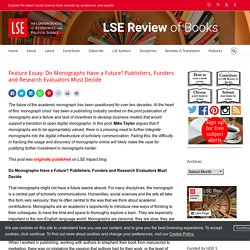
At the heart of this ‘monograph crisis’ has been a publishing industry centred on the print publication of monographs and a failure and lack of incentives to develop business models that would support a transition to open digital monographs. In this post, Mike Taylor argues that if monographs are to be appropriately valued, there is a pressing need to further integrate monographs into the digital infrastructure of scholarly communication.
Failing this, the difficulty in tracking the usage and discovery of monographs online will likely make the case for justifying further investment in monographs harder. This post was originally published on LSE Impact blog. Do Monographs Have a Future? Feature Essay: The Case of Brexit, Expertise and Linguaphobia: Cosmopolitanism, Language and the Politics of Value by Sarah Burton. Practice of Change. There are 4 types of motivation–here’s what each does to your brain. The risks of treating 'academic innovation' as a discipline (opinion) Education Technology and the New Behaviorism. Academic standards: back to the future - Wonkhe. Journal of Pedagogic Development. How E-Reading Threatens Learning in the Humanities - Commentary.
Home Page- IRIS Digital Repository. Recomposing Scholarship: The critical ingredients for a more inclusive scholarly communication system. Scholarship is not just about publication, but about interaction, interpretation, exchange, deliberation, discourse, debate, and controversy.
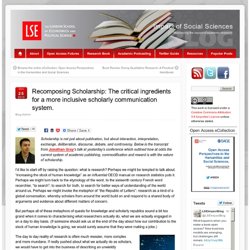
Below is the transcript from Jonathan Gray‘s talk at yesterday’s conference which outlined how at odds the current system of academic publishing, commodification and reward is with the nature of scholarship. I’d like to start off by raising the question: what is research? Perhaps we might be tempted to talk about “increasing the stock of human knowledge” as an influential OECD manual on research statistics puts it. Perhaps we might turn back to the etymology of the word, to the sixteenth century French word recerchier, “to search”: to search for truth, to search for better ways of understanding of the world around us. SMIRK jQuery Mobile Web App Start page. SMIRK by Imperial College, Loughborough University and the University of Worcester, modified by Marion Kelt Glasgow Caledonian University is licensed under a Creative Commons Attribution 4.0 International License.

JOLT - Journal of Online Learning and Teaching. Volume 10, No. 1 (March 2014) Incoporating a special section on "Massive Open Online Courses" Volume 9, No. 4 (December 2013) Volume 9, No. 3 (September 2013) Volume 9, No. 2 (June 2013) Special issue on "Massive Open Online Courses" Volume 9, No. 1 (March 2013) Volume 8, No. 4 (December 2012) Volume 8, No. 3 (September 2012) Volume 8, No. 2 (June 2012)
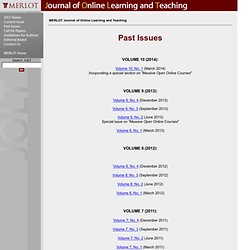
Open University Innovations Report #2. This series of help sheets is designed for people who are trying out distance and online education for the first time, and for teachers who have already taught at a distance and want to try something new.
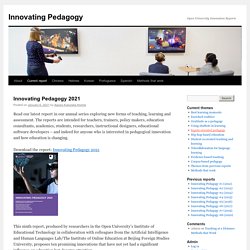
Each help sheet outlines one approach to learning at a distance and provides guidance on how to put this into practice. All the help sheets are based on approaches covered in past Innovating Pedagogy reports and take into account that students may have only limited access to technology and the Internet. The latest report in our annual series explores new forms of teaching, learning and assessment for an interactive world, to guide teachers and policy makers in productive innovation.
Download Innovating Pedagogy 2020 This eighth report, produced in collaboration with the National Institute for Digital Learning (NIDL), Dublin City University, Ireland, proposes ten innovations that are already in currency but have not yet had a profound influence on education in their current form. Revision techniques - the good, the OK and the useless. 17 May 2013Last updated at 21:34 ET By Deborah Cohen Health Check, BBC World Service It's the time of year where students are poring over their books, trying to ensure they are prepared for their exams.
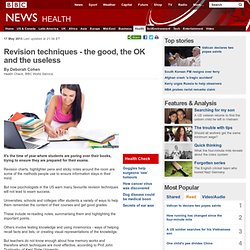
Revision charts, highlighter pens and sticky notes around the room are some of the methods people use to ensure information stays in their mind. But now psychologists in the US warn many favourite revision techniques will not lead to exam success. Universities, schools and colleges offer students a variety of ways to help them remember the content of their courses and get good grades. These include re-reading notes, summarising them and highlighting the important points.
Others involve testing knowledge and using mnemonics - ways of helping recall facts and lists, or creating visual representations of the knowledge. But teachers do not know enough about how memory works and therefore which techniques are most effective, according to Prof John Dunlovsky, of Kent State University.
Plan ahead. Academic writing: why no 'me' in PhD? How not to write a PhD thesis. In this guide, Tara Brabazon gives her top ten tips for doctoral failure My teaching break between Christmas and the university’s snowy reopening in January followed in the footsteps of Goldilocks and the three bears.
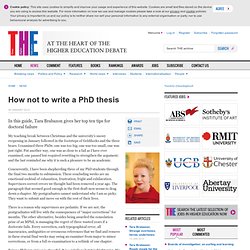
I examined three PhDs: one was too big; one was too small; one was just right. Put another way, one was as close to a fail as I have ever examined; one passed but required rewriting to strengthen the argument; and the last reminded me why it is such a pleasure to be an academic.